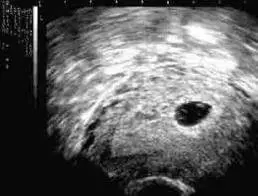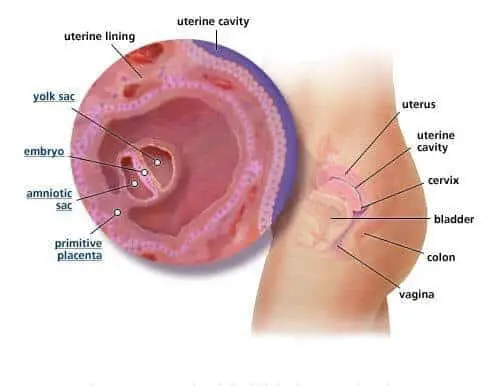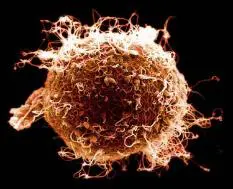The vast majority of pregnancy tests are positive by the end of week 5, though some women end up having to confirm by blood test or ultrasound. If you have a scan this early, you won’t see much but a small circle (the yolk mentioned in week 4). That yolk supporting your baby is now 90 percent complete, by the way.
What does my baby look like at 5 weeks pregnant?
Well, it doesn’t look like a baby yet–that is if you could even really see it. Your baby is about 1.5 to 2.5 millimeters in length, or roughly the size of a grain of rice. During this week, the ball of dividing cells that are your baby separate into three layers: the ectoderm, mesoderm, and endoderm.

The outer layer, or ectoderm, has begun to form a neural tube, sometimes referred to as a “fetal pole.” The spinal cord, brain, hair, skin, nails, tooth enamel nerves and more come from this layer.
The middle layer, or mesoderm, forms into muscle, bone, cartilage and the heart. Amazingly, your baby’s heart should be complete, and begin to beat sometime between 5 weeks pregnant and 6. You won’t be able to hear it on a doppler for some time, but it may be visible by ultrasound as a faint flickering.
Finally, the third and inner layer forms organs such as the lungs and liver. Though, keep in mind, most of the above are only beginning to form and won’t be complete for some time. Yes, 5 weeks pregnant is a busy time for baby.
How are things for momma at 5 weeks pregnant?
At 5 weeks, you might begin experiencing pregnancy symptoms. You may feel exhausted, and breast tenderness could become an issue (consider investing in comfortable bras). Some women also experience more cramping or even a feeling of fullness in the uterus during week five. The surge of hormones this week causes symptoms similar to those of your menstrual cycle in general. As that can commonly include headache, it’s important to note that you should avoid aspirin if you do opt for pain relief. Aspirin can be harmful to your baby. Consult your health care provider before taking any over the counter medication, including herbal or home remedies. You can read a full list of some of the earliest signs/symptoms of pregnancy here.



